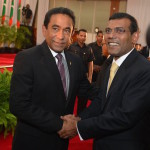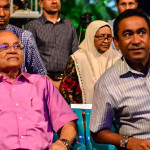The Jumhooree Party (JP) in January split from the ruling coalition and allied with the opposition Maldivian Democratic Party (MDP) to “defend the constitution” against what they allege to be President Abdulla Yameen’s repeated constitutional breaches. The new alliance left many confused given the JP’s key role in former President Mohamed Nasheed’s 2012 ouster.
When Haveeru asked Nasheed how he could now trust JP Leader Gasim Ibrahim, he said: “It will be very easy [to understand the alliance] if we talk about interests instead of trust. In the political sphere, nobody should trust the other”.
This statement, I think, perfectly captures the rotten political culture that stands in the way of democratisation in the Maldives. President Nasheed is right. What we have is a political culture where nobody should trust the other. It is indeed a culture where nobody could. “Should” only arises where “could” exists.
It is a culture of extreme opportunism and cynical behavior, established through years of complex, interlocking dependencies fed by corruption, oligarchic money, crime, and patronage. Floor-crossing by elected MPs, some to multiple parties and back in one term, is just one visible aspect of its depth.
But, democracy will not function in the Maldives without a political culture in which we can be confident that the other’s commitment to minimum democratic principles and behaviour will transcend their personal interests.
Sacrifices, compromises, humility
Without this commitment, our only hope is that politicians’ interests and differences always harmonise with democracy. But interests don’t always harmonise with democracy. Substantive differences don’t always benefit from democracy.
Democracy thrives on sacrifices of interests. It requires painful compromises with substantive differences, be they religious or philosophical. And, importantly, democracy derives its sustenance from an ethic of humility.
The ethic of humility decries arrogance, hubris, and bossing around. Democrats dislike treating people as pawns on a chessboard and acting as though one knows all the right moves. That is also why democracy requires honest and robust debate, discussion, and critique.
This is not to say through an opportunistic game of duelling interests, this or that political reform may not happen. It’s also true that in moments of harmony of interests good outcomes could materialise. Sometimes the outcome may not even be what the participants intended.
Democratic failures
The past decade is rife with instances where politicians across the spectrum favored their own interests over democratic process, allowing mistrust, cynicism and opportunism to thrive on.
President Nasheed’s controversial detentions of Gasim and Yameen and the Criminal Court Chief Judge Abdulla Mohamed, during his term are instances of failure of this transcendental commitment to the democratic process. The 2012 coup by the then opposition parties through the security services is the ultimate breach of this commitment.
Jumhooree Party’s contestation of the first round of presidential elections in 2013 without any reasonable grounds and the abuse of the Supreme Court to manipulate the electoral process is another extreme example where “interests” transcended the commitment to democracy.
Now, President Yamin’s turn towards what may be a form of “competitive authoritarianism,” whereby, through legislative manipulation, he now can control an already corrupt judiciary and other independent state institutions, shows his commitment to democracy does not transcend his narrow political interests.
Yamin has succeeded in removing the Chief Justice and perhaps the only just Justice in the Supreme Court through legislative manipulation by his party’s majority in the parliament. This, of course, could help him manipulate the elections in 2018.
Democracy has become ever more elusive.
A combination of institutions and human behaviour
I’m of course not saying politics is for angels. But without a political culture based on certain minimum human behavioural commitments, democracy cannot be the “only game in town”, which, political scientists Juan Linz and Alfred Stepan claim, is a test of democracy’s consolidation.
I think one of Amartya Sen’s important points in The Idea of Justice is also that institutions alone don’t result in justice. Similarly, institutions of democracy — be they perfect constitutions or genuine elections — alone don’t result in democracy.
A people and a political elite that are behaviorally and attitudinally committed to democratic rules and principles are as crucial.
That is also why I am skeptical of the MDP’s claim that the solution to authoritarian turns in our politics is adopting a parliamentary system.
The forgoing analysis is bleak. A democracy survey in the Maldives in 2013 already painted a bleak picture for the country. The survey points to a crisis of public confidence in key democratic institutions and extraordinarily high levels of public cynicism towards politics as compared to other transitional states.
But that same survey also shows there are some reasons to be optimistic.
Youth comprises around 30% of the population. It is these youth groups that tend to gravitate towards democratic values. A political culture based on their empowerment and mobilisation is perhaps how we may achieve and sustain democracy.
Azim Zahir worked at the President’s Office and Transparency Maldives. He has a Masters in Political Science from the University of Sydney.
All comment pieces are the sole view of the author and do not reflect the editorial policy of Minivan News. If you would like to write an opinion piece, please send proposals to [email protected]





Ask the young adults today what they prefer as to the future of their country?
They need to be heard - it is their future and the future of their children at stake today.
It is time to be visible, speak up, take charge and make changes for you.
Like a swamp crocodile that was introduced into the pristine and abundant marine waters of the Maldives, democracy is an alien reptile that is seeking a habitat, which Maldives naturally does not possess.
Maldivains have lived scattered into 200 islands for over thousands of years. They called is Dhivehi Raaje, which means the 'Land of Dhivehin'
They lived under a little or no central administration. Killing and stabbing was never heard of. There was a evolved system of Governance. But all this was discarded as a part of the '30 year dictatorship'. The baby was thrown out with the bathwater of the dirty 30 years.
Then the mighty crocodile of democracy was brought in. The importer of the reptile has advertised it as a gentle and smooth pet thats ideal for a marine environment. He did a sale like any good salesman.
Yes, democracy cannot be and has not been the 'only game in town' as proven by thousand years of Maldives history. But hey, who cares, as long as you make a good sound bite.
Touching on your optimistic end note - the youth is the key to long term sustenance of a democracy based on collective objectivity as opposed to blind cynicism.
However, the entire saga of our youth still remains largely unaddressed as we (the nation and its government) have failed during the 1990s and still continue to fail to invest in enhancing the quality of our human capital.
The youth bulge of the 1990s did not translate into top quality working class citizens for the nation as we had majority of students failing the school system between grades 1-12 whilst we covered that fact up by glorifying the minority few ultra bright students who scored 12 As in O levels destined only for university emeritus professorship.
Sad but obvious fact is, we still do not get an outstanding Maldivian candidate in job interviews. The kind that values a stable democracy so that he or she can be a responsible citizen, earn a living and support a family. A youth with this mindset are a rare breed of Maldivians as is the unicorn.
Yes, We still continue to fail to invest in the quality of our 30% youth population now. And they too a destined to roam the streets and in coffee houses at the expense of their ageing parents.
Our schools still produce a majority of failures and minority of passes. We still choose to hide the facts behind the bright few top 10ners.
Our university and private colleges are in the business of accepting students without no admission criteria whatsoever and have perfected the art of printing certificates so the year end statistics are marketable to the halfwit public.
We will never breakaway from this cycle unless and until we choose to accept the fact that our education institutions need severe reforms in order to capitalise on our youth.
Nasheed did not wake up one fine morning and abandoned whatever principles he had and decided to work with Gasim because he was rich and handsome. The context is one in which former rivals are working together to stay out of jail and avoid a kangaroo trial. Those are very personal reasons, but the interests benefit everyone else too in preventing a slide towards authoritarianism.
Optimism that the youth would thrive to develop the country, is non existent sorry to say.
As long as the flow of white powder, meth, crack, sex and pills continue and the youth allowed to be high in the night and sleep in the day, arrested today and released tomorrow…their minds won't grow to think a damn thing!
You cannot achieve peace when extreme religious views, greed and corruption in politics and a mock democracy clash!
The party leaders need to learn the nuances of a coalition government. No doubt, PPM, MDP,JP and Adhalath parties have their vote banks and hence its difficult to foresee a situation where one single party can get the majority in any of the elections! Yes, a coalition culture is going to stay (till the new generation of youth are politically united for the good governance rather than swing while voting). The question that need to be answered as well , is whether political parties ( read the leaders) are willing to honor the words once elected ! There is no return from where the country has reached in terms of party system . Yes, its not a new adage that politics is of interest and not of trusts and in politics hardly there is any permanent foe too! And, it happens when the parties are hollow in their long term philosophies or its almost overlapping one another except the fight for the chair. When the politicians speak and take models of UK and USA , Singapore Finland etc as their models for education, Health care and Social security schemes, why they fail to adopt the apparent party culture of those nations too?? and why they go for the subcontinent model of petty politics than party politics??
No GAYYOOM will ever want to give power to anybody!
They will care a damn for anything!
By hook or by crook they will ensure they retain absolute power!
This is 30 years of seeing an experience!
It is what they were after; and it is what they finally got!
Yes! The youth need to be considered in the case.
But, the question is; is it possible to get any help from them?
During the great 30 years of GAYYOOM rule, majority of them, as already said, have been sent to the dogs!
Apart from staying high at night and sleep in the day, they are incapable of telling what is cabbage!
It is hatred fear and religion the GAYYOOMS use as tool for encircling peoples into various groups to divide and rule!
It is that they are using to destroy whatever light that came towards Maldives!
Unless and otherwise a peoples are ready to sacrifice; our future is bleak!